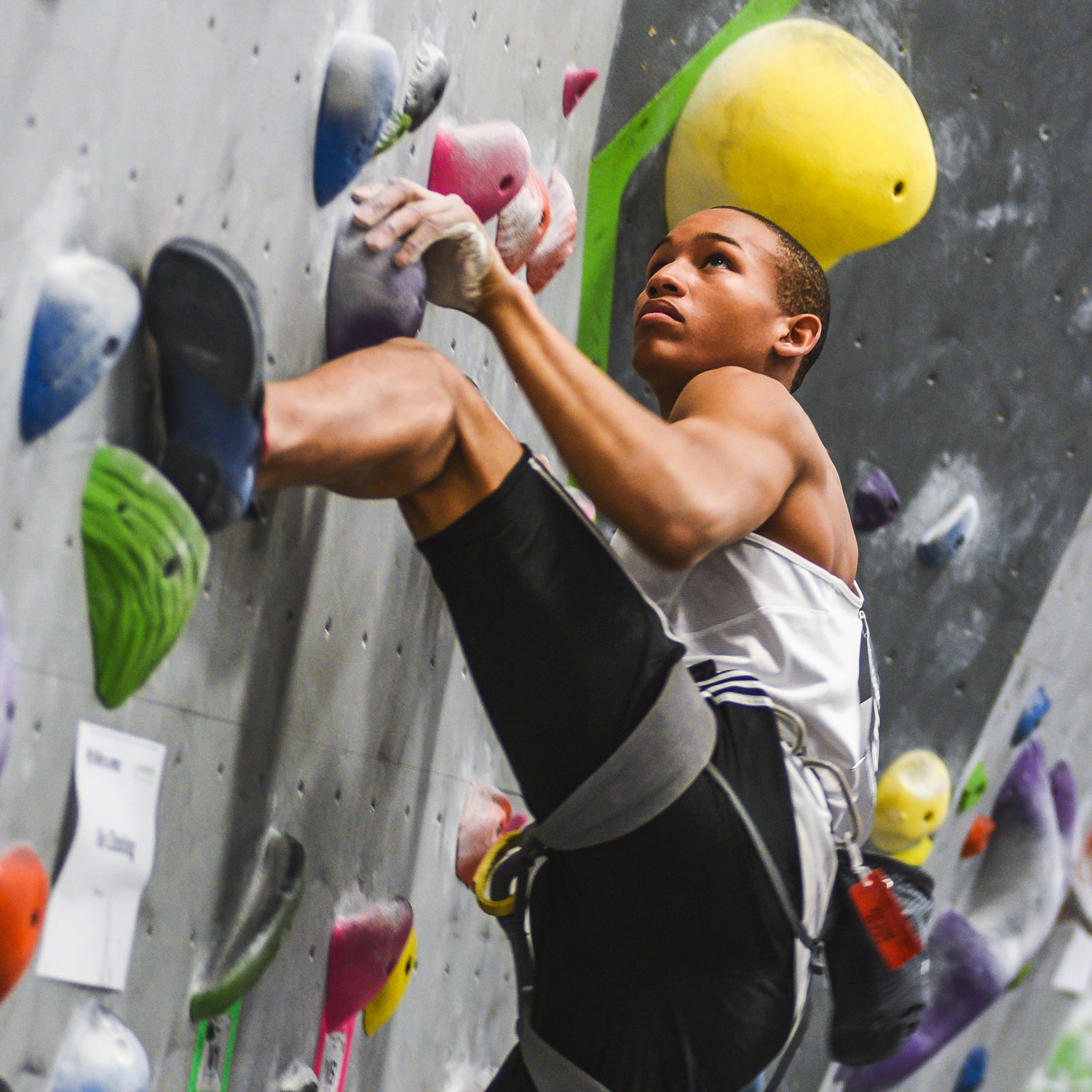I remember one of my coaches constantly telling me I was “too big” to be successful in climbing when I was young.��I was reminded on a regular basis: “We’ve��never seen champions that��look like you.” This was a reference to my size, rather than my race. I remember having to say how much I weighed in front of my peers, revealing that my weight was significantly higher than others’. I remember snack breaks, when I wasn’t allowed to indulge with other climbers because I had to watch my weight. As a young person, these experiences planted a seed that subconsciously fueled an assumption that��controlling my weight was the only way I’d ever accomplish my climbing goals. Even when my doctor told me, when I was 13, that I was unhealthily underweight, I took this as a sign that I was doing a good job. I constantly looked for other ways to keep my weight��under control.
Recently, I wrote ��about my experiences as a young rock climber that revealed my struggles with an eating disorder. I was extremely uncomfortable sharing the post initially, but I was convinced that telling my story could help others going through similar situations. Immediately after I published it, I received hundreds of private messages on social media, by email, and over text. In those notes, many other climbers opened up about their personal struggles with eating disorders, and parents and coaches reached out because they wanted to learn about early warning signs and preventative measures.��
One common theme in the messages surprised me: I heard from lots of guys who had experienced the same problems I had. Many of them thought their experiences were unique to them, since eating disorders are often considered a “girl thing.” On one hand, their responses were comforting to me—they let me know I wasn’t alone. But I also realized that these other boys and men felt alone in their own struggle, and this feeling of isolation made them scared to speak up or ask for help. My post made them feel like at least one person could relate to what they were going through, not knowing there was a whole network of people who shared these experiences.
Eating disorders in sports, especially ones��where performance is��linked to a strength-to-weight��ratio, are probably more common than we realize. An unhealthy obsession with food is an issue that plagues many rock climbers and other athletes, regardless of gender. No two bodies are the same: I have climber friends who can eat anything they want and never gain a pound. For many of us, however, food and weight-management issues are��constant struggles that can easily spiral out of control. Young athletes are the most vulnerable, because our bodies naturally experience significant changes during puberty that inevitably affect our climbing abilities. If left unchecked, these issues can continue throughout adulthood and cause serious long-term physical and psychological damage.��
It’s important for adults to understand the impact that their words and subliminal messages can have on kids. When young people have experiences that fuel body-image insecurities, they rarely report or discuss them. I didn’t. Even when my coach constantly made disparaging comments about my weight, I didn’t tell my mother. I knew that if I did, she would take immediate action and likely suspend my practices. At the time, I was climbing better than I ever had��and exceeding many of my climbing goals. I feared that if I separated myself from something that I knew was working,��my climbing would stop improving. I also worried I wouldn’t get to hang out with my friends at the climbing gym.
Despite my efforts to hide what I was doing, my mother always kept a close eye on me. When she cooked meals, I would either make an excuse about why I wasn’t hungry��or pick at my plate and only eat what I thought had the least calories. Sometimes I would even wait for her to leave the dinner table so I could put my food at the bottom of the trash. Whenever she asked me how I felt and why I wasn’t eating, I’d give her whatever excuse I could think of.��
At the time, I didn’t know she was starting to become concerned about my weight loss��and had begun��monitoring my food intake and behavior: my excessive desire to run��and her missing senna tea��(an organic laxative)��left hints that were hard for her to ignore. By the time I started getting extreme migraines, feeling sick all the time, and��frequently suffering from��acid reflux, she had already put the pieces together and planned an intervention with my doctor. Her decision saved my life.��
If you’re a parent or a coach of a young athlete, it’s important to that they may be struggling with an eating disorder. I unknowingly exhibited many common symptoms.��Coaching staff, personal-training programs, and governing bodies should collaborate with nutritionists and trainers who are knowledgeable about best practices for elite adolescent athletes; it’s crucial to educate leaders in the climbing community on how to have healthy conversations about food and weight. Parents should also be incorporated into this process, so they can reinforce healthy practices and be prepared to recognize early signs of possible eating disorders.
If you’re an athlete, it can be tempting to think that eating less food and doing more cardio are��the easiest ways to get��in shape to send your projects. But while this may work in the short term, your body will eventually crash��from a��lack of nutrients and proper maintenance. I learned this lesson after years of conversations with coaches, nutritionists, and my peers. Everyone’s body is different, and each person requires different kinds of training and resources to reach their maximum potential.��
Over the years, I’ve had a strong support system of therapists, coaches, and other professionals to help me work through many of my traumas, and allowed me to unlearn the toxic thought processes and bad habits of my eating disorder. They helped me understand more about my body and the training programs that work best for me, and taught me how critical proper nutrition is for supporting strenuous physical activity. It took some time for me to fully grasp and accept this alternate way of thinking.
Eventually, I was able to figure out how my body responded to certain types of food��and how to utilize them to improve my workouts. As I started implementing these concepts, I began gaining healthy weight and muscle mass. Over time��I became more comfortable with my size��and no longer felt apprehensive doing things like going out to eat with my friends in public. I even made it a part of my weekly schedule,��suggesting healthy and interesting��food options. Learning to turn my relationship with food into a healthy and fun experience significantly changed my life.
It took me a long time to realize food shouldn’t dictate how I live. It shouldn’t be the reason why I don’t participate in activities that make me happy. Relearning what works for me and my body��has been a rewarding process, and I’m thankful to be in a position to share my experiences. I want��those��who are still struggling with eating disorders to know��it’s OK to ask for help. There’s nothing to be embarrassed about. Healing from an eating disorder is a difficult process that many of us will deal with for the rest of our lives. But I can tell you: it’s worth it. Getting help will allow you to continue doing what you love while feeling healthy and strong for years to come.


